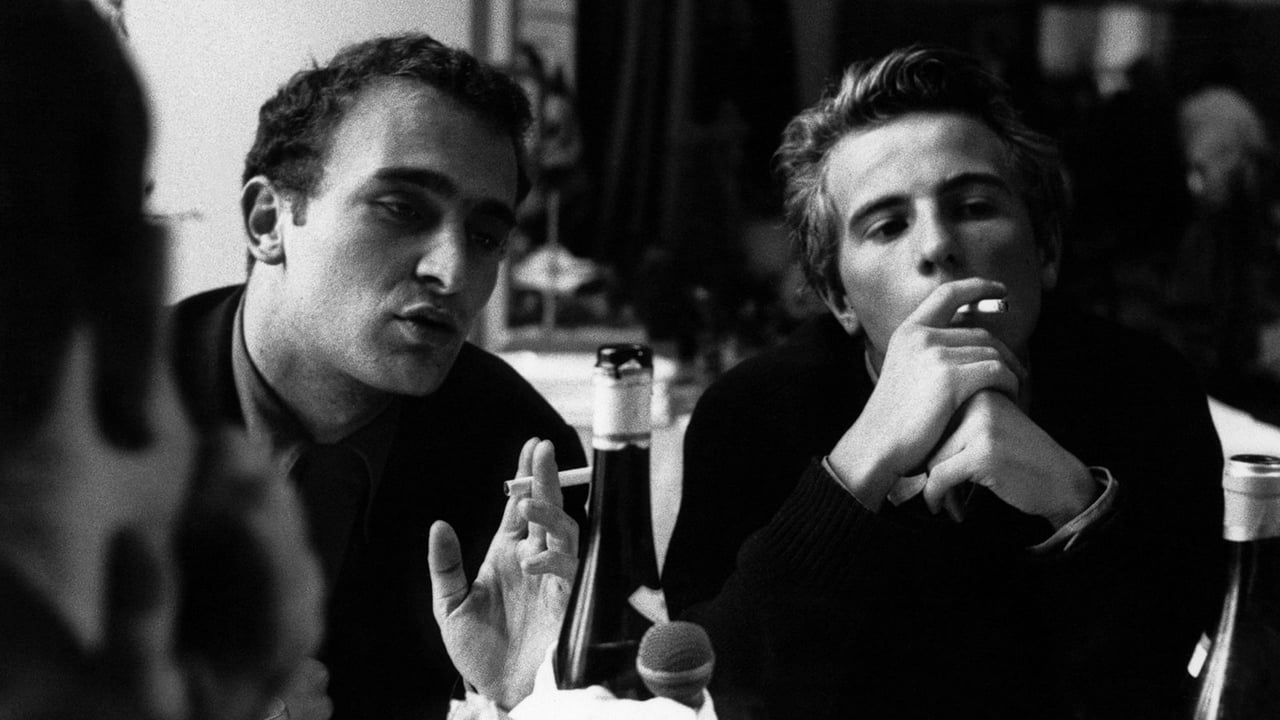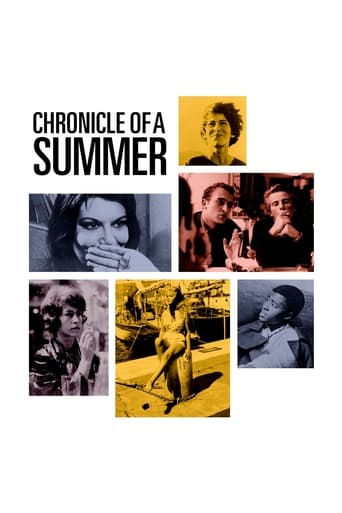

Jean Rouch is remembered as an oddity in film history, an artist working in between of fact and fiction as well as the era of colonialism and post-colonialism. He is especially often crowned as the founder of ethnographic cinema, but "Chronicle of a Summer" (1961) made by Rouch and Edgar Morin is something a little different. It is the breakthrough film of cinéma vérite or "truth cinema" which had a huge impact on the following French New Wave, most of whose filmmakers admired Rouch.Already in his earliest documentaries, Rouch isolates himself from his own time by focusing on engagement and immersion instead of observation. Interaction between the observer and his object -- or rather between subjects -- becomes vital. As vital is embracing the presented subjects' personal and collective world views, which form a fascinating entirety in Rouch's "I, a Black Man" (1958). In a word, the other and the self are of the same reality to Rouch. Although a representative of so-called truth cinema, Rouch and Morin's film does not concern any epistemic and scientific truth, but rather the truth of the appearance of the intersubjective reality. The camera takes part in action, ceases to exist, but at the same is inseparably present. A fabric of real emotions, thoughts, lies and acts is born which can be taken as a truth of one kind. On the one hand, Rouch and Morin attempt to revolutionize the cinema or at least to turn its lens to itself, but on the other, their sociological mission is to find out how does the modern man live. Hence they ask "Are you happy?" from random people in the streets. Rouch's "The Human Pyramid" (1961) might be more well organized, though utterly poetic, than "Chronicle of a Summer", but the latter is more essay-like which also associates it with the new wave. The remarks of the meta-level are not as detached from the rest of the film as in "The Human Pyramid", but still fact and fiction merge in an essential fashion. However, Rouch didn't only affect new wave filmmakers for his cinematic methods but also for his image of the world and man. There is indeed great human beauty in the film. During the interviews and other scenes, the camera becomes a penetrating mirror to whom one can reveal all of one's secrets. Perhaps this also happens to the viewer in a lesser extent. On one level, Rouch and Morin reveal the need to talk and share in an individualistic society. On the other, they tell something enduring about man, life and cinema.
... View MoreIt has a somewhat simple beginning: Edgar Morin and Jean Rouch chose some characters and follow them around, organizing round-table discussions with them and trying to get a handle of their lives and how they are affected by living in 1960s Paris. The movie itself, however, becomes more complicated as it becomes a more experimental approach to the ever-present documentary conundrum: Truth. As Morin and Rouch play around with different ideas and approaches to making a Truthful picture of "a summer", they have to deal with problems of whether or not they're directing, how to truly show a person's character unchanged by a camera's presence, and all of those issues dealing with the burden of representation and what the subjects desire out of the process of being subjected to the camera's eye.However, there is no truth in media--there is only representation. Is this a problem? Morin and Rouch's documentary is itself a representation of discovering representation, which makes it infinitely self-reflexive and self-aware. Thus, it becomes problematic to truly decide whether or not the documentary is "successful" or not, especially since Morin and Rouch include an denouement where they discuss their impressions themselves. Does this documentary even need the subjects it represents in order to get it's own themes across, or do in fact the subjects deserve a more straight-forward exposition? These questions, not the answers, are the point of this documentary.--PolarisDiB
... View MoreDugan McShain Anthropological Film Chronicle of a summer Chronique d'un étéFilmmaker Jean Rouch, in coordination with sociologist Edgar Morin, create a story out of seemingly random interviews and anecdotes. Together they create a piece that describes life in Paris circa 1961, they converse with their friends and associates about life, the current war in Algeria, and the mindset of the daily life of Parisians. Using the newly available 16mm camera they set out to do what no one had done before them: try and capture daily life and discuss it. They talk at length about politics, arguing on film, and discuss, both during the film and at the end when the filmmakers show their finished work to the participants and have them dissect it. They give feedback, feelings and talk about the characters, describing what worked and didn't, what felt real and what seemed contrived. The people that they interview are across the board when looked at socioeconomically, intellectually, and racially, providing alternate views about the problems faced, the stories that they needed to tell to the camera and the trials that were associated with their lives.I was, to say the least disappointed with the final product that was shown. As I was watching the film there came a scene where the two filmmakers are discussing their participation and the feat that they had just accomplished with the finished film ready to be shown. It was a very intimate scene where it seemed as if both of the filmmakers were unaware that they were being filmed and as such proceeded to expound on the principles, and the theory of making an anthropological film. It was half way through this conversation that I realized that they staged this discussion not as a candid frank debate but as a 'realistic end cap' to put on their film to add flair and realism. What seemed at first as a novel approach to film-making came off more as a clever marketing ploy, using the audience as a sounding board, and bringing the audience closer to the subject matter of the film through the use of intimacy. The filmmakers opted for participation in the film instead of the typical vein of anonymity. Reflexivity is a device that is used to vary the distance from a subject, giving the idea that the filmmakers, the product and everything that goes along with it a unity in the production. This style is self-serving in that the filmmakers could be seen prompting the subjects and providing a direct line of questions that they could use to form a solid piece. In the court of law this is called 'leading the witness' in order to get the desired answers that you seek, as opposed to the answers that come naturally from a subject matter that is brought up. Rouch gives specific questions that lend themselves to specific answers. "I would argue that most anthropologists implicitly believe content should so dominate form in scientific writing that the form and style of an ethnography appears to "naturally" flow out from the content." - (Ruby, Studies in the anthropology of Visual Communication, Pg 106,Vol. 2, No. 2, Fall 1975). In providing specific questions, they do not let the life naturally 'flow' but instead impede it at their own will destroying the illusion that they have created. These filmmakers seem almost like they wish to participate in the very spectacle they wish to show, and cannot distance themselves from the subjects for fear of losing notoriety.Morin and Rouch are extremely open to their subjects, providing valuable insight into their minds, as well as the minds of the people whom they are interviewing. This certainly provides for honesty in front of the camera creating a cushion of comfort for the subjects so that the camera does not seem to interfere as much a simply record. In certain scenes it seemed as if we were an observer regarding these people with a cold unfeeling eye. The argument in the hallway for example. This does not lend itself to a self-conscious conversation. There are moments in the film that do seem very contrived however. There is a scene of a woman walking through the streets of Paris along with her walking we hear her telling the story of her father's internment and her own in a Nazi death camp. This is obviously a scripted scene. It lends itself to disbelief when we see that she is walking, lost in thought. The technique of us hearing those thoughts is vital to this disbelief. The film-making was excellent at times, as I said, giving the sensation of an omniscient- floating eyeball, observing the people at their daily lives. This feeling is ruined however when we are privy to the Rouch's and Morin's conversation on what they feel the outcome of the film represents. It creates a feeling of false voyeurism then, incompatible with the sensitive proximity that we have just watched. The scene in the theater when he shows the characters dissecting each other is especially grating as it lends it self even more to a Dali-esquire surrealism where the characters are watching themselves as we watch them.
... View MoreI stepped on a box of upturned cocktail sticks once, and would happily do it again if it would get me out of ever having to see this again. The art of watching paint dry seems like a spectator sport in comparison. At the mid point of this movie i seriously considered gauging my eyes out with a rusty spoon but i had been drained of the energy that would enable me to do so. This film was intended to explore 'life' however it made me question whether or not i wanted to keep living mine. On a serious note, in the screening i was in, i spotted 7 people sleeping and half the audience simply walked out. Do not operate heavy machinery while watching or thinking about this so called film, i call it a video that allows real people to experience the monotony of manic depression. Watch Stuart Little instead.
... View More